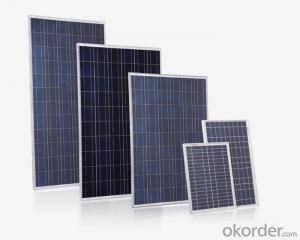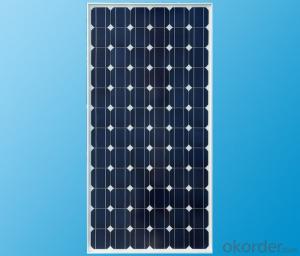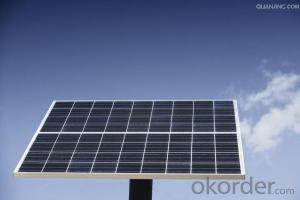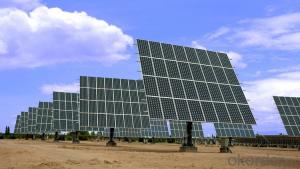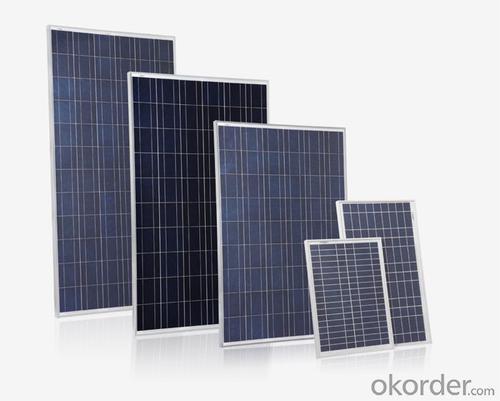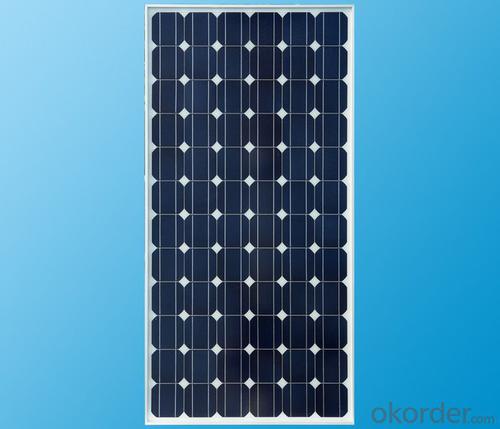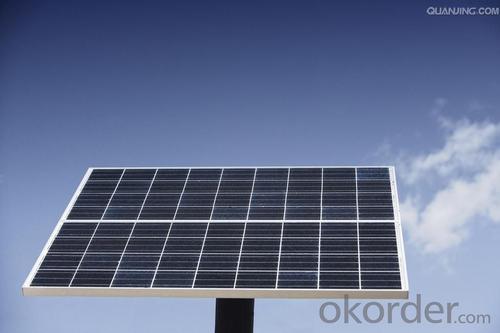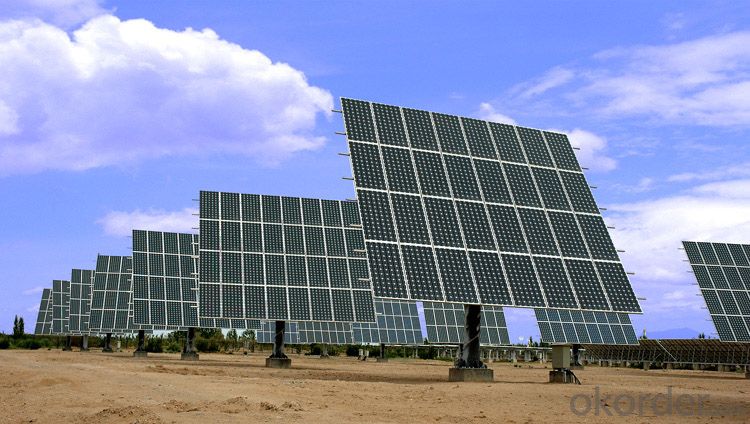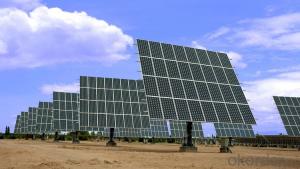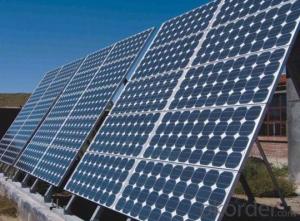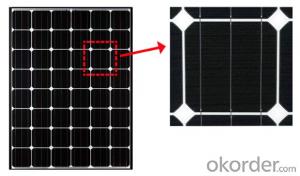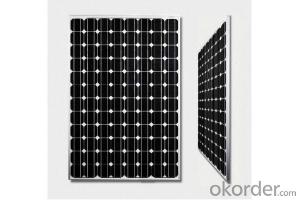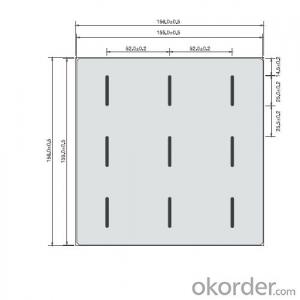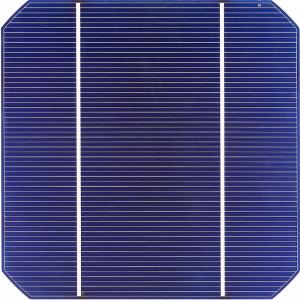Solar Cells for Sale Canada - Favorites Compare 100W Monocrystalline Solar Panel Price
- Loading Port:
- China Main Port
- Payment Terms:
- TT OR LC
- Min Order Qty:
- -
- Supply Capability:
- 10000000000000 watt/month
OKorder Service Pledge
OKorder Financial Service
You Might Also Like
Quick Details
| Place of Origin: | Guangdong China (Mainland) | Brand Name: | CAP | Model Number: | 50w100w150w200w250w300w |
| Material: | Monocrystalline Silicon | Size: | 1385*1035*75mm | Number of Cells: | 72pcs |
| Max. Power: | 300w | type: | solar panel | color: | blue&black |
| warranty: | 5 years |
Packaging & Delivery
| Packaging Detail: | standard export package for solar panel |
| Delivery Detail: | 7-15 days for solar panel |
Specifications
solar panel
High Efficiency
25 years Warranty
High-transmissivity low-iron tempered glass
Solar Panel
50w100w150w200w250w300w
Characteristics
1,High and stable conversion efficienly based on over 4 years professional experience
2 ,High reliability with guaranteed +/-10% output power tolerance
3,Proven materials,tempered front glass,and a sturdy anodized aluminum frame allow modules to operate reliably in multiple mountily configurations
4,Combination of high efficicncy and attractive appearance
Quality and Safety
1,25 year 80%,10 year 90% power warranty 3 year power warranty
2,ISO9001:2000 (Quality Management system) certified factory
3,Product Quality warranty & products Liability Insurance to guarantee and user' benefits
4,Certifications TUV Intercert, CE Temperature Coefficients
| Module Type | 100w | 150w | 200w | 250w | 300w |
| Maximum Power at ST(Pmax)W | 100wp | 150wp | 200wp | 250wp | 300wp |
| Maximum Power Voltage(Vmp)V | 36/18 | 36/18 | 36/18 | 30.8v | 36/18 |
| Maximum Power Current(Imp)A | 2.77/5.55 | 4.16/8.33 | 5.55/11.1 | 8.11A | 8.33/16.66 |
| Open Circuit Voltage(Voc)V | 39.5/19.05 | 39.3/19.4 | 39.6/19.5 | 36.2V | 39.6/19.8 |
| Short Circuit Current(Isc)A | 3.04/6.09 | 4.58/9.16 | 6.1/12.2 | 8.7A | 9.16/18.33 |
| Cell Efficiency(%) | 18.60% | 18.10% | 18.60% | 17.80% | 18.10% |
| Module Efficiency(%) | 17.70% | 17.20% | 17.70% | 17.10% | 17.20% |
| Operating Temperature°C | -40°C to +85°C | -40°C to +85°C | -40°C to +85°C | -40°C to +85°C | -40°C to +85°C |
| Maximum system voltage | 1000V(IEC)DC | 1000V(IEC)DC | 1000V(IEC)DC | 1000V(IEC)DC | 1000V(IEC)DC |
| Power tolerance | -0.03 | -0.03 | -0.03 | -0.03 | -0.03 |
| Temperature coefficients of Pmax | -0.45%/°C | -0.45%/°C | -0.45%/°C | -0.45%/°C | -0.45%/°C |
| Temperature coefficients of Voc | -0.27%/°C | -0.27%/°C | -0.27%/°C | -0.27%/°C | -0.27%/°C |
| Temperature coefficients of Isc | 0.05%/°C | 0.05%/°C | 0.05%/°C | 0.05%/°C | 0.05%/°C |
| Weight(kg) | 8 | 11 | 14 | 20 | 25.5 |
| Number of cell(pcs) | 4*9 | 4*9 | 6*10 | 6*12 | 6*12 |
| Dimensions(mm) | 1194*534*35/30 | 1580*808*50/35 | 1471*670*40/35 | 1640*992*50 | 2000*1050*50 |
- Q: What is the role of solar cells in powering remote surveillance systems?
- Solar cells play a crucial role in powering remote surveillance systems by converting sunlight into electrical energy. This renewable energy source provides a reliable and sustainable power supply, eliminating the need for traditional electricity sources or frequent battery replacements. With solar cells, remote surveillance systems can operate autonomously and continuously, ensuring constant monitoring and security in remote areas without access to grid power.
- Q: 24V 200W solar cells can charge 12V battery?
- 24-volt battery pack to 12-volt battery charge is possible, because the battery block resistance is large, allowing the output short-circuit.
- Q: Are there any health risks associated with solar cells?
- There are no direct health risks associated with solar cells themselves. However, the manufacturing and disposal processes of solar panels can have some environmental impacts and potential health risks if not managed properly.
- Q: Can solar cells be used on rooftops?
- Yes, solar cells can be used on rooftops. In fact, rooftop solar panels are a popular choice for residential and commercial buildings as they provide an efficient way to harness solar energy and generate electricity.
- Q: How to explain to students how the solar cells are made?
- The solar cells are made in a high technology way, in which the silicon is a vital part.
- Q: What is the impact of solar cells on reducing water usage?
- Solar cells have a positive impact on reducing water usage because they generate electricity without needing water for cooling or steam production, unlike traditional power plants. This reduces the strain on water resources and helps conserve water for other important uses.
- Q: What is the maximum efficiency of a solar cell?
- The maximum efficiency of a solar cell refers to the highest percentage of sunlight that can be converted into usable electricity by the cell. Currently, the highest efficiency achieved by commercial solar cells is around 26-27%. However, in laboratory settings, experimental solar cells have reached efficiencies of up to 46%.
- Q: Can solar cells be used in cloudy weather?
- Yes, solar cells can still be used in cloudy weather, although their efficiency may be reduced. Cloud cover reduces the amount of sunlight available, which can result in a decrease in power output from solar cells. However, solar cells can still generate electricity from diffuse light, so they can still produce some energy even in cloudy conditions.
- Q: Can solar cells be used in powering remote weather stations?
- Yes, solar cells can be used to power remote weather stations. Solar cells convert sunlight into electricity, making them an ideal and sustainable power source for remote locations where access to traditional power grids may be challenging. The abundance of sunlight in many regions allows solar cells to efficiently generate electricity, providing a reliable source of power for remote weather stations.
- Q: Can solar cells be used in cold climates?
- Yes, solar cells can be used in cold climates. While they may not perform at their maximum efficiency in extremely cold temperatures, modern solar cell technology has advanced to be able to generate electricity even in low light and cold conditions. Additionally, snow on solar panels can be easily cleared to ensure proper functioning.
Send your message to us
Solar Cells for Sale Canada - Favorites Compare 100W Monocrystalline Solar Panel Price
- Loading Port:
- China Main Port
- Payment Terms:
- TT OR LC
- Min Order Qty:
- -
- Supply Capability:
- 10000000000000 watt/month
OKorder Service Pledge
OKorder Financial Service
Similar products
Hot products
Hot Searches
Related keywords
